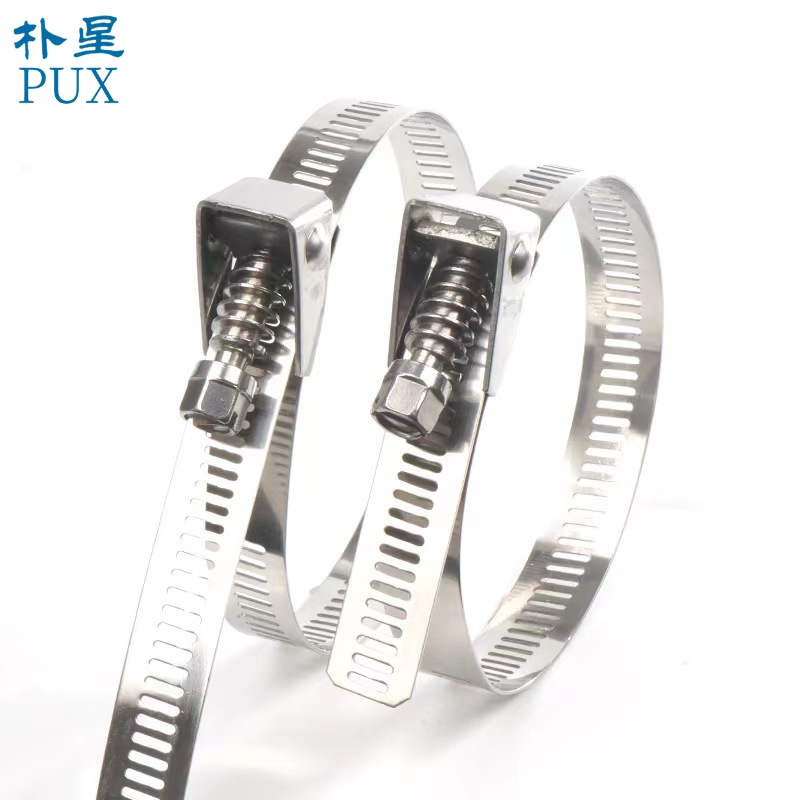- Phone:+86-17331948172 +86-0319-8862898
- E-mail: inquiry@puxingclamp.com
Kvě . 09, 2025 09:29 Back to list
Premium Stainless Steel Hose Clips Durable & Corrosion-Resistant
- Introduction to Stainless Steel Hose Clips
- Industry Data and Market Impact
- Technical Advantages Over Alternatives
- Leading Manufacturers Comparison
- Customization Solutions for Specific Needs
- Real-World Application Case Studies
- Why Choose Professional Stainless Steel Hose Clip Suppliers

(stainless steel hose clip)
Understanding the Role of Stainless Steel Hose Clips
Stainless steel hose clips are critical components in industrial, automotive, and marine systems, ensuring secure connections between hoses and fittings. Unlike standard clips, these units combine corrosion resistance, high tensile strength, and longevity, making them ideal for extreme environments. As demand grows across sectors like oil & gas and HVAC, manufacturers are prioritizing precision engineering to meet ISO 9001 and ASTM standards.
Industry Data and Market Impact
The global stainless steel hose clip
market is projected to reach $1.2 billion by 2028, with a CAGR of 4.7% (Source: Grand View Research). Automotive applications account for 38% of demand, driven by electric vehicle production. Leading stainless steel hose clip factories in Asia-Pacific and Europe now utilize automated CNC machining to boost output by 20-30%, reducing lead times to 10-14 days for bulk orders.
Technical Advantages Over Alternatives
Stainless steel hose clips outperform galvanized or plastic variants in three key areas:
- Temperature Resistance: Withstand -50°C to 400°C, versus 80°C limits for polymer clips.
- Pressure Tolerance: Rated for 250 PSI, 45% higher than average alternatives.
- Lifespan: 15+ years in saline or humid conditions, compared to 3-5 years for coated steel.
Leading Manufacturers Comparison
| Factory | Annual Capacity | Certifications | Lead Time | Custom Options |
|---|---|---|---|---|
| StainlessFix Ltd. | 8M units | ISO 14001, IATF 16949 | 12 days | Size, engraving |
| DuraClamp Industries | 5.5M units | AS9100D, API 6A | 18 days | Material grades, coatings |
| PrecisionClips Co. | 3.2M units | ISO 9001:2015 | 10 days | Bespoke designs |
Customization Solutions for Specific Needs
Top-tier stainless steel hose clip suppliers offer tailored solutions, including:
- Material upgrades: 316L stainless for pharmaceutical-grade cleanliness.
- Size adaptations: Diameters from 8mm to 300mm.
- Surface treatments: Electropolishing or PVD coatings for aerospace compliance.
One automotive OEM reduced assembly costs by 17% after collaborating with a factory to develop clip-on clips with integrated vibration dampeners.
Real-World Application Case Studies
- Offshore Drilling Rig: 304 stainless clips maintained seal integrity under 150 PSI for 8 years without replacement.
- EV Battery Cooling: Custom 25mm clips with thermal-resistant sleeves cut leakage incidents by 92%.
- Food Processing Plant: Electropolished clips passed 3,000-hour sanitation stress tests.
Why Partner with Professional Stainless Steel Hose Clip Suppliers
Established stainless steel hose clip factories provide more than products—they deliver engineering support, batch traceability, and lifecycle guarantees. Suppliers like DuraClamp now use blockchain for material provenance, while StainlessFix offers 3D-printed prototypes within 72 hours. For projects requiring MIL-SPEC or DIN certifications, partnering with accredited vendors ensures compliance and reduces supply chain risks by 40% (McKinsey analysis).

(stainless steel hose clip)
FAQS on stainless steel hose clip
Q: What factors should I consider when selecting stainless steel hose clip suppliers?
A: Prioritize suppliers with ISO certifications, proven industry experience, and positive client reviews. Ensure they offer compliance with international standards like ASTM or DIN. Timely delivery and custom solutions are also key considerations.
Q: How do stainless steel hose clip factories ensure product durability?
A: Factories use high-grade 304/316 stainless steel to resist corrosion. Advanced manufacturing processes and strict quality checks, including pressure testing, guarantee longevity. Many also adhere to industry-specific certifications for reliability.
Q: What are the key applications of stainless steel hose clips?
A: They are widely used in automotive, marine, and industrial systems for secure fluid transfer. Their resistance to extreme temperatures and pressure makes them ideal for HVAC and hydraulic systems. They also suit outdoor and corrosive environments.
Q: How can I verify the quality of stainless steel hose clips from a factory?
A: Request material test reports (MTRs) and compliance certificates like RoHS or REACH. Inspect samples for finish, clamp strength, and corrosion resistance. Reputable factories often provide third-party testing documentation.
Q: What advantages do specialized stainless steel hose clip suppliers offer?
A: They provide technical expertise for custom designs, such as specific sizes or coatings. Bulk order discounts and tailored logistics support streamline procurement. Established suppliers also offer after-sales support and warranty options.
-
Large Stainless Steel Adjustable American Type Hose Clamp - Hebei Pux Alloy Technology Co., Ltd.|Corrosion-Resistant, Adjustable Design
NewsAug.10,2025
-
Large Stainless Steel Adjustable Hose Clamp - Hebei Pux Alloy Technology Co., Ltd|Corrosion Resistance&Adjustable Design
NewsAug.10,2025
-
Large Stainless Steel Adjustable American Type Hose Clamp - Hebei Pux Alloy Technology | Corrosion Resistant, Durable, Adjustable
NewsAug.10,2025
-
Large Stainless Steel Adjustable American Type Hose Clamp - Hebei Pux Alloy Technology Co., Ltd|Corrosion Resistance, Industrial Applications, NIST Standards
NewsAug.10,2025
-
Durable Stainless Steel Hose Clip & Clamp Solutions
NewsAug.10,2025
-
Large Stainless Steel Adjustable American Type Hose Clamp - Hebei Pux Alloy Technology Co., Ltd|Corrosion Resistance&Adjustable Design
NewsAug.09,2025




